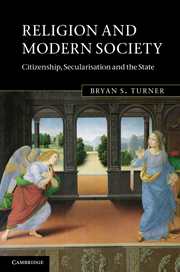Book contents
- Frontmatter
- Contents
- Acknowledgements
- Introduction: the state of the sociology of religion
- Part I Theoretical frameworks: the problem of religion in sociology
- Part II Religion, state and post-secularity
- 7 The secularisation thesis
- 8 Legal pluralism, religion and multiculturalism
- 9 Managing religions: liberal and authoritarian states
- 10 Religious speech: on ineffable communication
- 11 Spiritualities: the media, feminism and consumerism
- 12 Religion, globalisation and cosmopolitanism
- 13 Civil religion, citizenship and the business cycle
- 14 The globalisation of piety
- References
- Index
10 - Religious speech: on ineffable communication
Published online by Cambridge University Press: 05 June 2012
- Frontmatter
- Contents
- Acknowledgements
- Introduction: the state of the sociology of religion
- Part I Theoretical frameworks: the problem of religion in sociology
- Part II Religion, state and post-secularity
- 7 The secularisation thesis
- 8 Legal pluralism, religion and multiculturalism
- 9 Managing religions: liberal and authoritarian states
- 10 Religious speech: on ineffable communication
- 11 Spiritualities: the media, feminism and consumerism
- 12 Religion, globalisation and cosmopolitanism
- 13 Civil religion, citizenship and the business cycle
- 14 The globalisation of piety
- References
- Index
Summary
Introduction
Sociology broadly defined consists of the study of social interaction involving the exchange of meaning, symbols, values, objects and occasionally persons. At the core of this notion of exchange is language, and hence there has always been a close proximity between the philosophy of language and social theory. Recent critical theorists such as Jürgen Habermas (1984) have sought to construct the whole edifice of normative social theory on the idea of communicative acts. This definition of sociology is, of course, hardly controversial, but the very ordinariness of this definition points to some interesting gaps in sociological theory. The first is that it takes the social actor for granted, but what is a social actor? More specifically, can what we might call ‘immaterial agents’ (ghosts, spirits or angels) communicate? The second question is how do communicative systems manage the ineffable nature of religious speech? Religion is interesting from the point of view of a (secular) sociology of social action, because the communication of religious truths is typically ineffable, and hence religious systems tend to require a stratum of intermediaries (such as theologians and other intellectuals) to interpret and translate the ineffable meaning of sacred realms.
In societies where the great majority of people in the past could not read and write, the sacred written word had a special authority and power. There is always a tension between religious messages that are received by prophets and holy people as revelations and the process by which these messages are converted into texts.
- Type
- Chapter
- Information
- Religion and Modern SocietyCitizenship, Secularisation and the State, pp. 194 - 208Publisher: Cambridge University PressPrint publication year: 2011

